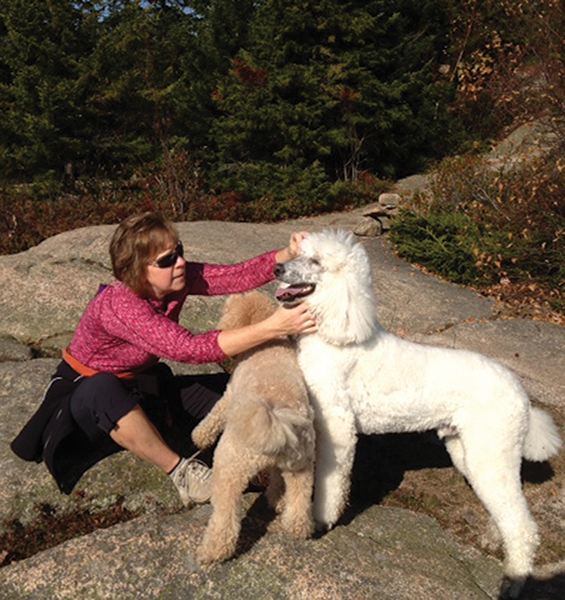Dogs with degenerative arthritis experience varying degrees of lameness, stiffness, and joint pain which is more apparent in the morning and after getting up from a nap. Although degenerative arthritis is progressive, it can be slowed down with the right tools. Therapeutic herbs can play a large role in controlling pain and inflammation as well as helping slow down the degeneration.
The herbs that I’ve included below have been proven to work for most dogs and are readily available but this is only a partial list as there are numerous others to choose from. All have different constituents that you should research further if you want the most effective and safe blend for your pet’s individual needs.
Herbs for Therapeutic Aid
My favorite group of herbs to work with for animals with degenerative joint disease is known as adaptogens. The reason I love adaptogens with animals especially is that they do a remarkable job of helping the body adapt to stress, they support normal metabolic processes and restore balance. Adaptogens increase the body’s resistance to physical, biological, emotional and environmental stressors and promote normal physiological function.
They are unique from other substances in their ability to restore the balance of endocrine hormones, modulate the immune system, and maintain optimal homeostasis (physiological balance). In other words, they “adapt” to the body stressors without being stimulating or suppressing. And almost every adaptogen has anti-inflammatory properties.
Here are some adaptogens to consider.
Withania somnifera, “Ashwagandha”
Parts used: Root
Medicinal actions:
Adaptogen, anti-inflammatory, antioxidant, immune amphoteric, antitumor, nervine, antispasmodic, chemoprotective activity.
Mostly used for:
Stimulates thyroid (good for hypothyroidism), anxiety, fatigue, nervous exhaustion, rheumatoid arthritis, adrenals, lymphoma, lymphosarcoma.
This is a wonderful herb for so many things that it’s hard to limit it to only the benefits it has on joints and tissues. Ashwagandha works synergistically with many other herbs to reduce muscle fatigue, autoimmune inflammation and to regulate the adrenal glands.
Eleutherococcus senticosus, “Eleuthero”
Parts used: Root
Medicinal Actions: adaptogen, antioxidant, immune tonic, muscular circulatory stimulant
Mostly used for: Strengthening immune system, increased athletic endurance, preventing immune depletion from excessive physical activity.
Research shows that Eleuthero root can prevent lactic acid build up when used daily. It’s claim to fame is its increased circulatory action, which is helpful with any inflammation, especially that of joint, cartilage, and tendon.
Emblica officianalis, “Amalaki”
Parts used: whole fruit, dried, typically powdered
Medicinal actions: Anti-inflammatory, rejuvenative, nutritive tonic, refrigerant, stomachic, hemostatic, and astringent.
Amalaki contains about 20 to 30 times the amount of vitamin C found in oranges, providing it with lots of antioxidants. Fighting pain alone isn’t enough; research shows that antioxidants are key in preventing further degeneration in joints. It also contains a high concentration of amino acids, trace minerals and other beneficial phytonutrients.
Amalaki also contains ascorbic acid, tannins, polyphenols, flavonoids, ellagic acid, gallic acid, emblicanin A+B and superoxide dismutase. Superoxide dismutase is an enzyme that helps break down potentially harmful oxygen molecules in cells that cause damage to tissues. Superoxide dismutase is known to promote the rejuvenation and repair of cells, while reducing the damage caused by free radicals.
Holy Basil or Tulsi oil can also be used topically for arthritis pain.
Other Adaptogens that can help reduce inflammation and pain associated with degenerative joint conditions include Asian ginseng, cordyceps, guduchi, reishi, rhodiola root, and schissandra berry.
Additional Herbs for Joints
Horsetail is an anti-inflammatory that contains salicylic acid to help control pain. When paired with Alfalfa leaf, which moves uric acid out of the body and contains many amino acids, vitamins and minerals, a synergistic effect may help build and repair cartilage. Alfalfa is also an excellent choice for geriatric animals. Horsetail should not be used with cats.
Meadowsweet and White Willow Bark are analgesics that can help with pain, contain salicylic acid and are anti-inflammatory. They should also not be used with cats.
Cat’s Claw is anti-inflammatory, immune modulating herb that works well in joint blends for osteoarthritis and debility.
Devil’s Claw is a great anti-inflammatory, analgesic and body tonic. This herb helps take pain away quickly while bringing the inflammation down.
Turmeric is from the ginger family. A volatile oil in the spice is as effective in relieving pain, under laboratory conditions, as equal amounts of steroids. Many of the healing of benefits of turmeric have been attributed to curcumin, a group of antioxidant compounds found in the root. Although curcumin is available as a standardized extract, the whole herb is more beneficial than the curcumin extract: only very small amounts of curcumin are absorbed into the bloodstream. Turmeric as a whole herb stays in the digestive tract longer than curcumin, releasing antioxidants along with other beneficial substances.
RELATED: Healing with turmeric golden paste for dogs …
Ginger relieves the pain of rheumatoid arthritis by stopping the immune system’s production of inflammatory leukotrienes. Ginger has been used for digestion, inflammation and many other ailments for thousands of years and scientists have found evidence to support ginger’s wide range of medicinal actions.
Solomon’s Seal is known in Chinese medicine to moisten dryness and relieve pain and spasm. It is by far the most interesting root I have ever harvested as it replicates the human spine. You must use care in harvesting to assure that the base of the root will come up intact, looking just like a coccyx. The side of the root has many little ones jutting out that replicate the nerves of the spinal column. Solomon’s Seal is used for anything related to the spine, as well as arthritis and joint pain.
Boswellia Serrata contains phytochemicals that stop the production of leukotrienes, which cause inflammation. It is best used as a powdered resin or liquid extract. Boswellia has been used as an anti-inflammatory for many years and is currently being researched and used in hospitals in Europe.
St John’s Wort is a nervine tonic and works well with injuries to bring the nerve endings to a calm, preventing inflammation if used right away. It can be used in synergistic blends for joint pain and tissue healing. St John’s Wort is also an antidepressant which can come in handy for helping your dog to overcome the emotional consequences of injury and to better cope with his pain. It is anti-inflammatory, antifungal, antiviral and antibacterial, all of which help with healing internally and externally.
Of course there are many more herbs that can benefit joints, tissue and cartilage. However I have worked with all of the above herbs in my practice, in some combination, with great success.
Nutritional Considerations
Hemp Seeds
No other single plant source has the essential amino acids in such an easily digestible form. Hemp seeds contain Linolenic acid (GLA), Omega-3s, linoleic acid, and are a pure protein source with anti-inflammatory effects. Hemp seeds contain vitamin B6, vitamin C, vitamin D and vitamin E.
RELATED: Hemp for dogs: Should you use it?
The importance of Vitamin E
Vitamin E is an important antioxidant that prevents the premature reaction of oxygen in the body and the breakdown of many substances in the body. Essential to the use of oxygen by muscles, vitamin E helps improve circulation and promotes normal clotting and healing. It also prolongs the life of red blood cells. Whole food sources of vitamin E are the safest and most effective choice. Foods rich in vitamin E include Swiss chard, spinach, kale, broccoli and vegetable oils, especially olive oil
Choosing a supplement for your dog can be a daunting challenge with all of the choices available. You can try your own blend of herbs or look for a synergistically prepared blend. Hopefully you now have a better idea of what to look for when selecting a herbal joint supplement.













